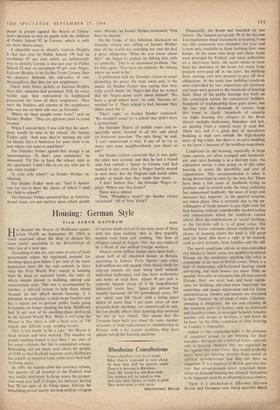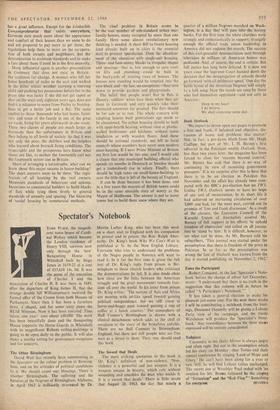Hoiising: German Style
From SARAH GAINHAM
BONN
His Honour the Mayor of Heilbronn (popu- lation 93,058 on September 30, 1963) is much exercised about the duty to declare his town 'white' . according to the derestriction of rents law of a year ago.
According to this act, any town or area of local government where the registered demand for dwelling-space goes below 3 per cent of the static population must lift the rent controls in force since the First World War; except in housing built by local or national funds, the rents of which remain pinned to building, upkeep and amortisation costs. This law is accompanied by another, a rent-aid system to help those whose incomes do not afford decent housing; it is intended, in particular, to help large families and has a means test to prevent public funds going to families no longer needing the help. Heilbronn had 54 per cent of its dwelling-space destroyed in the Second World War. What is worrying the Mayor is that there is still a hard core of 740 urgent and difficult cases needing homes.
This is not meant to be a joke -- the Mayor is dead serious and very worried. The number of people needing homes is less than 1 per cent of his town's citizens, but this is considered serious. Rebuilding did not begin until about the middle of 1949, so that in about fourteen years Heilbronn has rebuilt or repaired from ruins more than half its living space.
In 1949, six months after the currency reform, one quarter of all housing in the Federal area was totally destroyed. In large towns the propor- tion went over half, Cologne, for instance, having lost 70 per cent of its living space. During the rebuilding period nearly thirteen million refugees
of various kinds arrived in the area, most of them with less than nothing—that is, they urgently needed even food and clothing. The flow of refugees ceased in August 1961, but was replaced by a flood of one million foreign workers.
Almost seven million homes have been built-- about half of all inhabited houses in Britain, according to Labour Party figures—and some half-million are still needed. Only blocks built for migrant tenants are now being built without individual bathrooms, and they have washrooms and baths on each floor. About 40 per cent is centrally heated, much of it by long-distance industrial 'waste heat.' Space per person has steadily increased. Of 565 government areas, 397 are 'white' and 168 'black' with a living space deficit of more than 3 per cent; since all new privately-built dwellings are unrestricted in rent, the law chiefly affects older housing that survived the war or was rebuilt. This means that the Germans have built just about the same number of homes as need replacement or rehabilitation in Britain: with a far greater problem, they have almost solved the housing question.,
Financially, the boom was founded on two factors. The famous paragraph 7b of the Income Tax regulations freed investment in housing from tax; this concession was rescinded last year and is now only available to those building their own homes. At the same time large and cheap loans were provided by Federal and local authorities on a short-term basis; the secret seems to have been the shortness of the terms, for many large projects were paid off in ten years, the building firms starting ever new projects to pay off their obligations. At the same time building standards were controlled by law, inspections are statutory and loans were geared to the standards of housing built. Most of the public housing was built on this concession system by commercial builders. Standards of workmanship have gone down, but the law and the demands of tenants keep this trend in check. Standards of amenity are high: housing for refugees in the Bonn district includes bathrooms, balconies and hot- air heating from a central stove in each flat. There was and is a good deal of speculative building at high cost outside the high-density areas of big towns; but there is no jerry-building as we know it because of the building inspections.
Conditions in old housing, especially in large town centres, are often cramped and inconveni- ent, and rural housing is in a decrepit state. An exhaustive survey is now going on of this older housing to assess the possibility and cost of regeneration. This accommodation is what is being derestricted in rents by the new Act. There have been a few cases of landlords trying to profiteer and in several cases the local authority has summonsed landlords; the wave of large rent increases has, however, to the general surprise, not taken place. This is certainly due to the un- willingness of fresh tenants to pay high rents for bad housing without considerable modernisation and redecoration which the landlords cannot afford. Here the continuation of 'social' building, as the Germans call it, is of great value. The building boom continues almost unabated in the classes of housing where the need is still great and for those who have a right to be housed, such as civil servants, large families and the old.
The worst conditions obtain in rent-controlled city blocks in 'black' areas, but nowhere in central Europe are the conditions anything like what is commonly to be seen in British towns. There is a lack of bathrooms, old-fashioned heating, much sub-letting, but such houses are never filthy or squalid. Not only in Germany but all over central Europe, there are strict laws and local regula- tions for building, and even more important, for ownership and tenant registration and for house administration. Owners and tenants are restricted in their 'freedom' by all kinds of rules. Chimney- sweeping is obligatory; the use and cleaning of the common parts of houses, such as staircases and laundry-rooms, is arranged between tenants; number and design of dustbins is laid down in by-laws. So the filthy condition of slum housing in London is impossible.
Added to this regulating habit is the pressure of organised groups to get housing fOr their members. Refugees are a political force----and not only in housing-7because they are organised by the regions .they come from; they would probably never have got housing priority from moral or political considerations had they not been so organised. It is a mystery of British post-war his- tory that ex-servicemen never organised them- wives to demand housing but allowed themselves to be imposed upon by profiteering house-owners.
There is a psychological difference between British and Germans over living quarters which
has a great influence. Except for the irreducible Lumpenproletariat that exists everywhere, Germans care much more about the appearance and comfort of their homes than we seem to do and are prepared to pay more to get them; the regulations help them to insist on the co-opera- tion of both owners and neighbours, but the determination to maintain standards and to make a fuss about them if need be is the first necessity.
More influential again is another precondition in Germany that does not exist in Britain : the readiness for change. A -woman who left her home hundreds of miles to the east and walked in the bitter winter weather carrying a starving child and pushing her possessions before her in the pram (she was lucky if she did not get raped or shot on the way) only eighteen years ago, does not find it a nuisance to move from Purley to Notting- ham to get a better job and a flat. The same applies to those thousands who lost home, furni- ture and some of the family in one of the great air-raids, living for years afterwards in one room. These two classes of people are much larger in Germany than the unfortunate in Britain and they belong to all levels of society. So that it was not only the poor, the shiftless and the helpless who learned about barrack living conditions. The respectable and the prosperous here know what slums are like, as neither the fourteenth earl nor the fourteenth mister can in Britain.
Short of arranging a catastrophe, what can we learn about this major success in house-building? The short answers seem to be these. The regis- tration of all housing by the real owners. Minimum standards of behaviour and upkeep. Incentives to commercial builders to build blocks of flats while tying thein firmly to general. standards of amenity and spacing. The financing of 'social' housing by commercial methods. The chief problem in Britain seems to be the vast number of sub-standard urban one- family houses, many occupied by more than one family. Here some almost revolutionary new thinking is needed. A short Bill to freeze housing land already built on in cities is the essential start to prevent speculation. Then the abandon- ment of the obsession with single-unit housing. Three- and four-storey blocks in irregular shapes and spacings--that is, low enough to save costs on lifts and plumbing—could be built in the backyards of existing rows of houses. The houses now standing would be emptied into the new block and—by law, no-exceptions—then torn down to provide gardens and playgrounds.
The belief that people won't live in flats is illusory; soldiers' wives love them when they get them in Germany and very quickly take their increased amenities for granted. The flats should be for sale or to rent. The whole concern with adapting houses built generations ago needs to be abandoned. No urban housing should be built with open-hearth heating, without tiled or plastic- walled bathrooms and kitchens, without noise insulation or with wooden floors. And these should be national standards, not left to local councils whose members have never seen modern mass-housing. If I were Prime Minister of Britain my first law would be this one; and I would add a clause that any municipal building official who spends six months in Denmark or Sweden should get a (subsidised) rise in salary. Finally, there should be high taxes on small-house-building to save the little that is left of the beauty of England.
It can be done because it has been done, and in a few years the mayors of British towns could be in the same enviable state of worry as the Mayor of Heilbronn. The answer is not to move towns but to build them anew where they are.





























 Previous page
Previous page